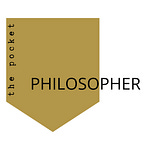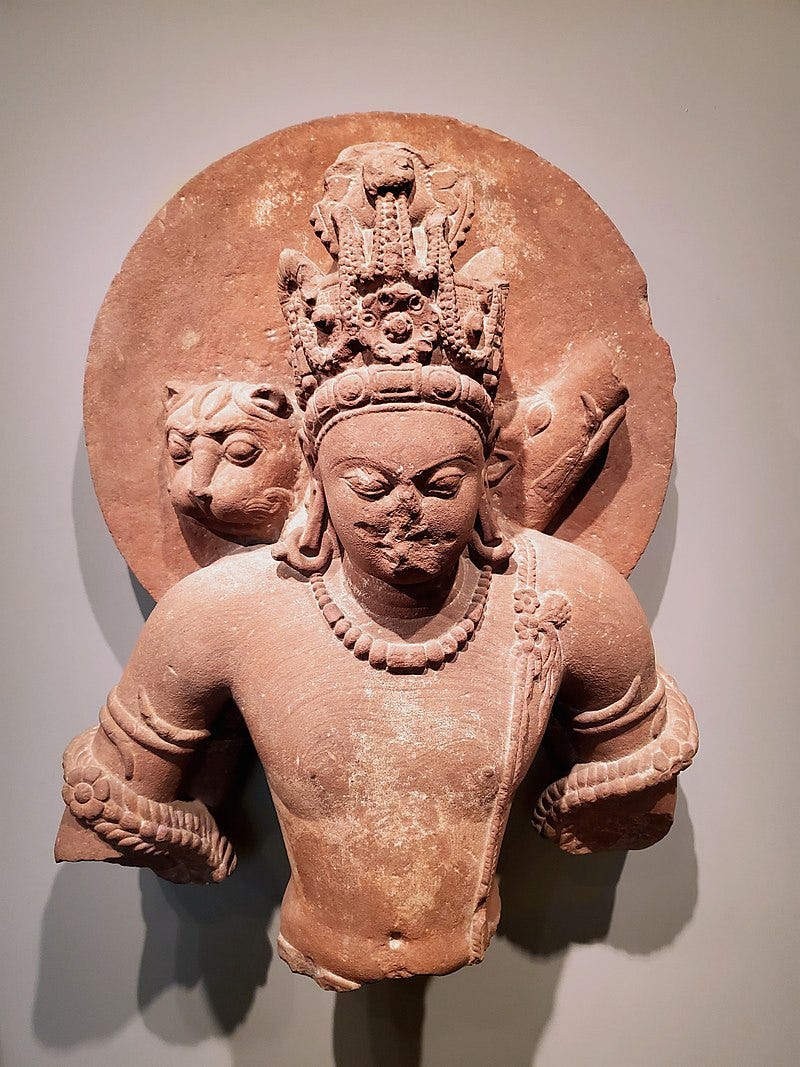Thought
You see, these are experiences that go past ethical judgments. Ethics is wiped out. Our religions, with the accent on the human…also stress the ethical. God is good. God is horrific the end of the world?
Now, in the Buddhist systems, particularly as we get them from Tibet, the Buddhas appear in two aspects; there is the peaceful aspect and there is the wrathful aspect of the deity. Now, if you’re clinging to your ego and its little world and hanging on, and the deity wants to open you, the wrathful aspect comes. It seems to you terrible. But if you are open, and open enough, then that same deity would be experienced as bliss.
—Joseph Campbell in conversation with Bill Moyers, 1988
(*It might be helpful to read “deities” above as itself a representation/myth of the path to liberation)
Application
Today’s letter might feel like quite a deep dive. If you have time, this would be an instance where the backstory below is very helpful.
In a nutshell, Myth is a system of psychology and the bedrock of identity and culture found within every community of history.
What’s even more interesting, is that often the same mythical beliefs will emerge in different cultures without evidence of diffusion, that is a common source from which the myths have been passed down.
This leads some scholars to believe that myth is actually an innate aspect to human psychology that emerges naturally through the course of mental, moral, and psychological development.
Myth is often associated with initiation. Initiation is a physical nurturing of myth in the material world, by guiding a young person through a “hero’s journey” in facing a fear, overcoming an obstacle, and achieving adulthood.
Myth is expressed in thousands of forms throughout history, but its common themes of self-discovery, fear-facing, and rebirth is an ethical framework all of its own.
In this way, myth has a way of disrupting our existing codes, rules, rituals, and frameworks. This journey is intended to disrupt daily life.
It’s the young person with the need to leave home, explore, forge a new path, challenge the status quo, face a challenge, start something new. We all hear this call, but few actually follow the sound.
In many ways, while on this journey rules to this point no longer apply.
The reason: myth takes one on a journey of ego-death.
Ethics in general can be thought of as the rules of the ego, the rules of the ordinary world. When we choose to take a journey beyond these frameworks, suddenly there are no constants. We are emerged in world of ambiguity in which we must discover our own definition of the good.
Fighting this fight to the end, not stopping until we internalize and understand our own reason for being, our own purpose, our deepest intentions, this is the work of a hero. And the journey is not on a battlefield, but deep inside the self, beyond the dualistic perception of our regular, egoic life.
As Campbell noted above
It seems to you terrible. But if you are open, and open enough, then that same deity would be experienced as bliss.
Perhaps the journey we are most afraid to take, is actually the key to our liberation.
Backstory
Joseph Campbell was a prodigious philosopher and researcher—perhaps the greatest of the last century. His work focused primarily on myth. He was an aggressive collector of myth from all over the world, in many instances being the first “westerner” to travel to places in the world where Indigenous or ancient tradition and myth was still practiced, and preserve it with the same care his contemporaries nurtured Aristotle or Kant.
Not incidentally, Campbell was key in consulting with George Lucas on the creation of Star Wars as Lucas wanted to create the truly universal story.
I cannot recommend his interviews filmed with Bill Moyers enough—filmed days before Campbell’s sudden death. Also, I recommend his book, The Hero with a Thousand Faces. It’s a dense, often tough read, but jammed packed with distilled wisdom.
His largest contribution to the great conversation is the realization that all myth is really one story he called the monomyth. He discovered in his work of collecting and comparing stories—from Navajo healing ceremonies to Sanskrit parables—that the same pattern was emerging over and over again.
He then noted how this pattern—ordinary life, call to action, challenge, death, rebirth—was found in similar forms all over the world. Often, the same stories would crop up in cultures that never had any interaction.
His explanation was that this journey, the internal journey of ego death and self-discovery, is the universal psychological goal of people whether they are conscious of it or not.
He also noticed how initiation experiences in many Indigenous communities fostered this growth in a controlled and communal way.
Young people of a certain age were often asked to fast, travel into the wilderness, discover the deities of the tribe, face danger, defend themselves against wild animals, and most importantly find their place not in the rules of society, but in the raw power of nature.
And this step—the vulnerability one feels in the face of the cosmos, the universe which could crush them in an instant—is the key to growth. Because more often than not, this vulnerable experience would not lead to death, but a realization of oneness.
If the power of the universe accepts you even in death, what is there to fear?
The capacity to feel safe and secure in the aloneness of the wilderness is the key to initiation and to understanding life on the other side of ethics, and everything else in the “ordinary” world for that matter.
Campbell believed that preserving this journey, this inward experience of death and rebirth, was the ultimate aim of our species. One could argue, this journey is the ultimate ethical end a person could strive for in this world. Because the legacy of a fully integrated, healthy person who has taken their own hero’s journey has the capacity to change the course of history.
One final caveat, please don’t read this as a request to live life void of ethics or principles. Rather, when we take this inward path and follow the heroes journey, we tend to find an alignment in life and leads us to act in the way that most ethical frameworks would ask of us in the first place. But, we are no longer are operating from rules, but somehow something much deeper.
I hope this was helpful friends, I cannot encourage a deeper study of Campbell, myth, and the heroes journey enough.
Until tomorrow,
-TPP
References:
https://billmoyers.com/content/ep-6-joseph-campbell-and-the-power-of-myth-masks-of-eternity-audio/
https://en.wikipedia.org/wiki/Joseph_Campbell
Image:
https://en.wikipedia.org/wiki/Vishnu#/media/File:The_God_Vishnu_in_Three_Incarnations._Northern_India_(Mathura),_Gupta_period,_mid-5th_century_AD._Boston_Museum.jpg












